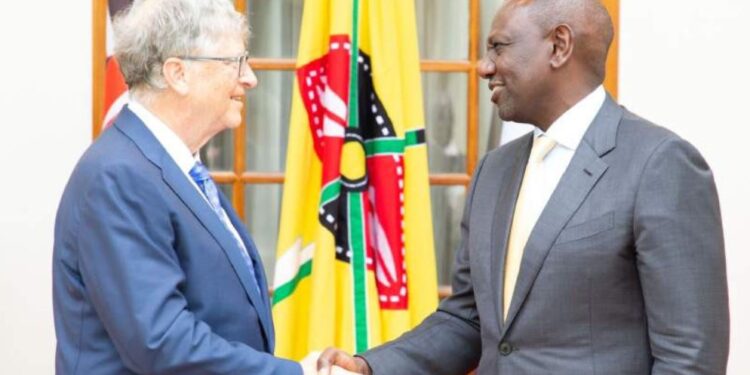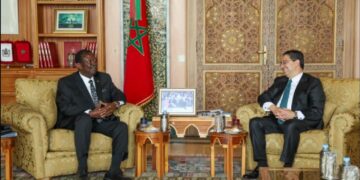Kenya has secured a major healthcare funding boost of Ksh64.65 billion (USD 500 million) from a global coalition of philanthropists aimed at improving maternal and newborn health. Announced during a high-level event in Abu Dhabi, the initiative will see Nairobi serve as the operational headquarters for a continent-wide effort to reduce preventable deaths among mothers and infants. The funding, led by the Gates Foundation, the Mohamed Bin Zayed Foundation for Humanity, and a group of American donors, comes at a time when many traditional donors have scaled back international aid.
The launch of the Beginnings Fund, as it has been named, comes at a time when global aid is undergoing seismic shifts. Major donor nations, notably the United States, have scaled back their commitments to international aid programs, including life-saving initiatives such as PEPFAR and USAID. In this challenging environment, the philanthropic sector has stepped forward to fill critical gaps, and Kenya stands out as a key beneficiary and driver of this new wave of health-focused development.
Alice Kang’ethe, the CEO of the fund, highlighted the collaborative nature of the effort. Rather than imposing external models, the fund aims to work closely with African governments, local experts, and community health workers. This philosophy of co-creation over imposition is not only respectful of local contexts but also a pragmatic strategy for long-term sustainability. “We are here to support, not dictate,” Kang’ethe emphasized. It is a perspective that resonates deeply in a region that has historically been on the receiving end of externally designed interventions with limited local ownership.
The fund’s primary goal is to save the lives of 300,000 mothers and newborns by 2030. To achieve this, it will direct resources toward the most pressing causes of maternal and neonatal mortality: postpartum hemorrhage, sepsis, and infant respiratory complications. The approach prioritizes cost-effective interventions that can be rapidly deployed in high-burden hospitals and communities. In addition to Kenya, the program will operate in Ethiopia, Ghana, Malawi, Lesotho, Nigeria, Rwanda, Tanzania, Uganda, and Zimbabwe. However, Kenya’s designation as the operational headquarters signals its emerging role as a regional leader in health sector innovation.
This development brings both short-term and long-term benefits for Kenya. In the short term, the infusion of funds will stabilize a health sector that has been grappling with the fallout of shrinking donor support. Programs that were previously under threat due to budget cuts—particularly those targeting vulnerable populations such as expectant mothers and newborns—will now receive renewed attention and investment. The healthcare workforce, which faced job insecurity as a result of aid disruptions, will benefit from more secure funding streams and enhanced training opportunities.
In the longer term, the establishment of Nairobi as the epicenter of a major pan-African health initiative creates new institutional capacity within Kenya’s health system. The country is poised to develop stronger data systems, clinical research platforms, and health service delivery models that can be replicated across the continent. Kenya’s universities, teaching hospitals, and public health institutes will have the opportunity to engage with global experts and play a leading role in shaping the future of maternal and infant healthcare.
The partners have also pledged an additional Ksh12.94 billion (USD 100 million) in direct investments separate from the main fund. These resources will support localized initiatives that further enhance maternal and child health outcomes. With backing from reputable organizations such as the Children’s Investment Fund Foundation, Delta Philanthropies, and the ELMA Foundation, the initiative benefits from a diverse donor base committed to measurable impact.
This ambitious undertaking is grounded in a shared understanding that maternal and infant deaths are largely preventable with the right tools, training, and infrastructure. The World Health Organization has documented that global progress in reducing neonatal and maternal mortality has plateaued in recent years, and in some regions, has begun to reverse. This stagnation is due in part to disrupted supply chains, constrained budgets, and under-resourced health systems. Yet, as the Beginnings Fund demonstrates, there is still a strong will—and now the means—to turn the tide.
Kenya’s health ministry will be a key partner in this initiative, working to align national priorities with the goals of the fund. The Ministry’s ability to facilitate coordination across county governments and leverage community health networks will be essential to ensuring that the benefits of this investment reach even the most underserved areas.
The project is also an opportunity for Kenya to export best practices drawn from its own experience. The country’s strides in digital health, mobile-based health records, and community outreach programs provide a strong foundation on which to build. Lessons learned from previous public health successes, such as the management of HIV and expanded immunization coverage, will inform this new phase of targeted maternal and infant care.
In sum, the Ksh64.65 billion aid package represents far more than financial relief. It is a strategic investment in Kenya’s future and a recognition of the country’s potential to lead regional health solutions. As Nairobi becomes the nerve center for one of the largest philanthropic health initiatives in Africa, Kenya steps into a new role, one not only of beneficiary but of architect, innovator, and guardian of life-saving maternal and newborn care across the continent.
Kenya’s floriculture industry is set to bloom even brighter in 2025 as flower exports are projected to surge to 110 billion Kenyan shillings, equivalent to approximately 851 million...
Read moreDetails









